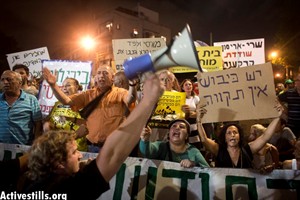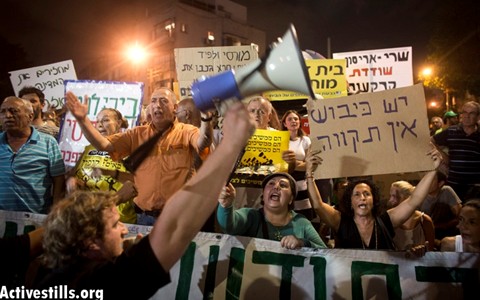
Thousands of demonstrators hit the streets of Tel Aviv on Saturday evening to mark the two year anniversary of the large social justice protests that took place in the city and across the country in 2011. The demonstration began from Habima Square at 8 p.m. and proceeded to Kaplan Street where an all night vigil was to be held until Sunday morning, the precise anniversary of the 2011 protests. A parallel demonstration in the Hatikva neighborhood in Tel Aviv was set to take place to remember Moshe Silman, the man who set himself on fire at a protest last year, according to the report. Before lighting himself ablaze, Silman said he received no rent assistance despite suffering a stroke recently and no longer being able to work at all.

Protesters commemorating a year for Moshe Silman’s self immolation and marking two years for social protests, July 13, 2013 (Photo: Activestills)
Organizers claim the objective is three-fold: to mark two years since 2011’s summer protest, a year to the death of Silman and to protest against the current neo-liberal and capitalist government’s economic policy. Protesters carried signs that read “It’s time to tax the rich” “Bibi + Lapid = Morsi, same revolution.” Amid a sea of banners and red flags — many of which blamed Finance Minister Yair Lapid for failing to fulfill his promises for social reform and blasted Prime Minister Benjamin Netanyahu for working to benefit wealthy tycoons — groups chanted “war” as they marched. One large sign read that Lapid “changed his mind, but not reality” and protesters called Lapid a liar and chanted “housing is not a luxury.” Hundreds who marched from Kaplan Street blocked traffic in Ayalon Highway, in the vicinity of HaShalom Interchange.
The 2011 protests, which culminated in a 500,000-plus rally in Tel Aviv, became a major factor in the 2013 elections, with some activists elected to the Knesset and a sense of economic injustice fueling strong election performances by the centrist Yesh Atid party and other neo-liberal political factions.


